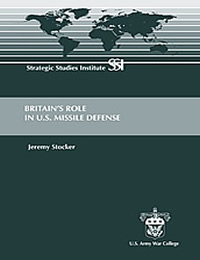Britain's Role in U.S. Missile Defense

Authored by Dr. Jeremy Stocker.
July 2004
44 Pages
Summary
Despite the apparent novelty of the subject, defense against ballistic missiles has been a persistent topic in transatlantic relations for over half a century. In particular, America’s European allies, especially Britain, have frequently been concerned by the wider implications of U.S. repeated efforts to develop and deploy missile defenses.
The end of the Cold War has completely altered the strategic circumstances within which ballistic missile defense (BMD) policy is formulated, while technological developments are making effective defense more feasible. However, the subject retains a large historical legacy of attitudes derived from earlier times and has lost little of its controversy.
Britain has a particular role to play in U.S. BMD plans, beyond its long-standing status as America’s most important ally. The United Kingdom is host to one of three Ballistic Missile Early Warning Stations (BMEWS) and to the European ground station for the Space-Based Infra-Red System (SBIRS), both vital elements in U.S. missile defense architecture. Britain also has a long record of technological cooperation in missile defense.
However, British Governments have consistently taken a different view on the nature and severity of the ballistic missile threat, and on the appropriate means by which to deal with missile proliferation. The UK is generally sceptical about the technological promise of active defense, heavily constrained by limited defense resources, and has a greater attachment than American governments to other means of nonproliferation.
Tactical defense against shorter-range missiles is now regarded as uncontentious, though also unfunded. In regard to strategic homeland defense, Britain does not regard itself as under a ballistic threat other than the long-established Russian and Chinese rocket forces. Continued adherence to diplomatic means and established deterrence postures is the preferred method of dealing with those capabilities. Britons do not share American concerns about North Korea, and are not prepared to view China as a long-term strategic competitor requiring a BMD response.
The UK is not prepared, however, to let disagreements over missile defense prejudice the two countries’ wider security relationship. It is also progressively shedding many of its previous concerns about the wider consequences of missile defense deployment and gaining a better appreciation of the advantages of collaboration in both the policy and technical fields. For America’s part, an understanding of the UK’s stance and a willingness to engage in honest and forthright consultation are essential if the United States is to maximize the advantages of international cooperation in missile defense and avoid some of its penalties.
Despite a recent focus on events in Iraq, missile defense remains a vital issue in U.S.-British relations and a subject of considerable intrinsic importance. Both countries need to better understand each other’s policies and concerns, and cooperate in providing effective and appropriate defense capabilities.
Access Full Report [PDF]: Britain's Role in U.S. Missile Defense
|
NEWSLETTER
|
| Join the GlobalSecurity.org mailing list |
|
|
|

